PERANAN TRAUMA OKLUSI TERHADAP TERJADINYA PERIODONTITIS
Abstract
Struktur periodontal yang sehat meliputi gingiva, sementum, ligamen periodontal dan tulang alveolar. Oklusi normal dan keteraturan gigi secara anatomis dan fungsional di lengkungan masing-masing penting untuk pengembangan dan pemeliharaan gigi yang sehat. Reaksi tulang dan ligamen tergantung pada besarnya, durasi dan arah tekanan. Trauma oklusi diketahui menyebabkan perubahan pada jaringan periodontal. Trauma dari oklusi dapat diklasifikasikan menjadi trauma primer dan sekunder. Trauma primer ialah tekanan oklusi yang mengenai periodontal sehat, contohnya termasuk restorasi yang terlalu tinggi, bruxism, ekstrusi ke ruang edentulous, dan pergerakan ortodontik. Trauma primer mengenai jaringan periodontal dalam satu arah (kekuatan ortodontik) atau sebagai jiggling force (gigi penyangga pada gigi tiruan). Trauma sekunder ialah tekanan oklusal yang mengenai periodontal yang telah rusak atau lemah. Trauma oklusi menyebabkan hipermobilitas pada gigi. Pada struktur periodontal, trauma oklusi berkontribusi lebih jauh dan lebih cepat menyebabkan inflamasi apikal dan kerusakan tulang. Resorpsi tulang merupakan adaptasi fisiologis dari ligamen periodontal dan tulang alveolar terhadap trauma oklusi. Trauma oklusi yang disertai inflamasi plak dapat meningkatkan perkembangan penyakit periodontal. Trauma dari oklusi saja tidak dapat menginduksi kerusakan jaringan periodontal. Tekanan oklusi merupakan kontributor potensial penyakit periodontal ketika tekanan ini menyebabkan trauma oklusi.
Kata kunci : oklusi, trauma oklusi, periodontal, periodontitis
Abstract
The healthy periodontal structures, including gingival, root cementum, periodontal ligament and alveolar bone. Normal occlusion and the regularity of the teeth in their respective arches were considered anatomically and functionally essential for the development and maintenance of a healthy dentition. The reaction of the bone and ligament depends on the magnitude, duration and direction of the forces. Trauma from occlusion is know to cause several change in the periodontal tissue. Trauma from occlusion can be classified as either primary or secondary. Primary trauma from occlusion is describe as an abnormal occlusion force acting upon a healthy periodontium, examples include high restorations, bruxism, drifting or extrusion into edentulous spaces, and orthodontic movement. Primary trauma may be exerted on the periodontal structures in one direction (orthodontic forces) or as ‘jiggling’ forces (abutment teeth in protesa). Secondary trauma from occlusion is an occlusal force acting on a reduced or weakened periodontium. In a healthy non-inflamed dentition, traumatic occlusion leads to hypermobility of teeth. In inflamed periodontal structures traumatic occlusion contributes to a further and faster spread of the inflammation apically and to more bone loss. Bone resorption in trauma occlusion should be interpreted as an adaptation of the ligament and bone to the altered functional requirements. In plaque-induced inflammation, trauma occlusion may enhance the disease progression. Trauma from occlusion alone cannot induce periodontal tissue breakdown. trauma occlusion is a potential contributors to the periodontal disease process when they cause occlusal traumatism.
Keywords : occlusion, trauma of occlusion, periodontal, periodontitis
Kata kunci : oklusi, trauma oklusi, periodontal, periodontitis
Abstract
The healthy periodontal structures, including gingival, root cementum, periodontal ligament and alveolar bone. Normal occlusion and the regularity of the teeth in their respective arches were considered anatomically and functionally essential for the development and maintenance of a healthy dentition. The reaction of the bone and ligament depends on the magnitude, duration and direction of the forces. Trauma from occlusion is know to cause several change in the periodontal tissue. Trauma from occlusion can be classified as either primary or secondary. Primary trauma from occlusion is describe as an abnormal occlusion force acting upon a healthy periodontium, examples include high restorations, bruxism, drifting or extrusion into edentulous spaces, and orthodontic movement. Primary trauma may be exerted on the periodontal structures in one direction (orthodontic forces) or as ‘jiggling’ forces (abutment teeth in protesa). Secondary trauma from occlusion is an occlusal force acting on a reduced or weakened periodontium. In a healthy non-inflamed dentition, traumatic occlusion leads to hypermobility of teeth. In inflamed periodontal structures traumatic occlusion contributes to a further and faster spread of the inflammation apically and to more bone loss. Bone resorption in trauma occlusion should be interpreted as an adaptation of the ligament and bone to the altered functional requirements. In plaque-induced inflammation, trauma occlusion may enhance the disease progression. Trauma from occlusion alone cannot induce periodontal tissue breakdown. trauma occlusion is a potential contributors to the periodontal disease process when they cause occlusal traumatism.
Keywords : occlusion, trauma of occlusion, periodontal, periodontitis
Full Text:
PDFDOI: https://doi.org/10.35790/eg.1.2.2013.3223
Refbacks
- There are currently no refbacks.

